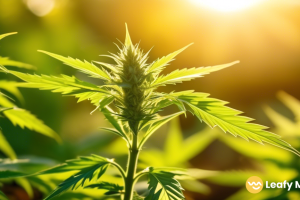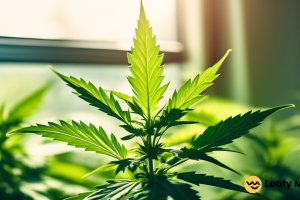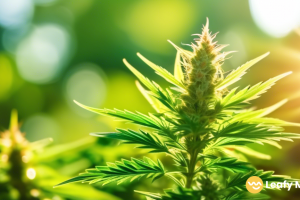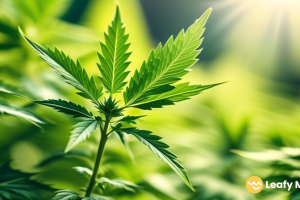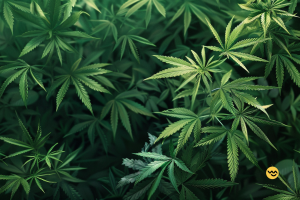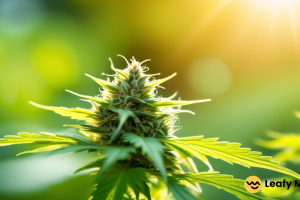Recreational cannabis or adult-use marijuana refers to legal weed sold in licensed dispensaries to adults over 21.
Cannabis products can be in the form of smokable buds, marijuana concentrates, vapes, edibles, or topicals.
What is Recreational Cannabis?
Marijuana and cannabis plants are often thought to be the same thing; however, the two terms are not exactly interchangeable. Cannabis refers to the broader plant species and can encompass all products made from Cannabis sativa. There are about 170 different cannabis species, including marijuana plants and hemp.
Often referred to as pot or weed, marijuana is explicitly referring to the products made from dried flowers or buds of the plant. They can include flowers, stems, and leaves. The main psychoactive compound is delta-9-tetrahydrocannabinol or THC. It also contains CBD, while hemp contains no THC and only CBD.
Weed is typically consumed through smoking but may also be ingested, added to food, and used topically. When smoked, THC enters the bloodstream and travels to the brain. The second most active cannabinoid is cannabidiol (CBD), which does not give the same psychoactive effects as THC.
Today several different strains can be bred to induce different responses in the user. Some marijuana plants are designed to help with insomnia, while others are meant to be energizing.
Different strains are used for different occasions based on the desired effect. The effects of marijuana may include relaxation, euphoria, increased appetite, altered perception, and impaired judgment.
U.S. History of Recreation Marijuanas Legalization
Marijuana first arrived in the United States in the early 1600s. The Jamestown colonists grew hemp, a variety of cannabis low in THC and do not have psychoactive effects, for use in making ropes, sails, and clothing. George Washington and Thomas Jefferson both grew hemp on their plantations.
At that time, marijuana was not used for recreation or medicine but primarily as a textile fiber. In the early 1800s, marijuana began to be used for medicinal purposes. People believed it could cure various illnesses, including asthma, cough, and venereal disease.
Marijuana began to be used as an ingredient in many patent medicines. For example, Lydia Pinkham’s Vegetable Compound, which was popular at the time, contained up to 9% marijuana.
The Politics of Cannabis
The use of marijuana as medicine was threatened by the increasing popularity of pharmaceutical drugs in the early 1900s. The pharmaceutical industry began spreading propaganda linking marijuana to crime and violence in response.
Marijuana legislation first came to the attention of U.S. officials in the early 1900s. In 1906, California became the first state to outlaw marijuana. By the 1930s, all states had some laws against legalizing cannabis.
The federal government made cannabis an illegal substance and outlawed possessing or selling marijuana with the passage of the Marijuana Tax Act of 1937. This Marijuana Tax Act effectively criminalized the cannabis plant.
The act was based on a report by Harry Anslinger, the first head of the Federal Bureau of Narcotics. Anslinger was initially appointed to head the bureau by his uncle-in-law, Andrew Mellon, the Secretary of the United States Treasury.
Mellon hired Harry Anslinger to target immigrants to line the pockets of his friends in the pharmaceutical industry who were pushing for a prohibition on marijuana.
While it is highly likely that Mellon had no problem with weed, he needed a way to make his friends money. Anslinger and sensationalized fear campaigns like Reefer Madness (1936) convinced the American public that marijuana led to drug crimes and had to be outlawed.
He also claimed stories of people driven insane by marijuana who then committed violent crimes. However, many people believe these claims were complete fabrications.
In 1970, marijuana was listed as a Schedule 1 drug, categorized as highly addictive and dangerous based on being without medical value under the Controlled Substances Act.
CBD has become a prevalent substance and is found in many different markets, including tinctures and remedies for pets. CBD is typically acceptable under all medical marijuana laws and has become a popular over-the-counter option for anxiety, relaxation, pain management, and more for humans and their furry friends.
CBD-derived from hemp is legal on the federal level, and cannabis-derived CBD is legal in certain areas depending on if their state will legalize medical marijuana.
Recent and current research has shown that cannabis has medicinal benefits and can help manage certain conditions. There has been a growing movement to legalize marijuana for medical purposes in recent years.
In the early 1800s, pot began to be used for medicinal purposes despite the chance of a criminal record for possession. People believed it could cure various illnesses, including asthma, cough, and venereal disease. In 1944, the “La Guardia Report” found that marijuana was not a dangerous drug and recommended decriminalizing it.
Since then, many people have campaigned for legalizing or decriminalizing marijuana, but there is still no national consensus on the issue.
The First States to End Cannabis Prohibition
In 1996, California became the first state to initiate marijuana law reform and legalize marijuana for medical use. Today, nineteen states plus the District of Columbia allow people to use marijuana for specific medical conditions such as chronic pain and intractable epilepsy.
Several other state lawmakers, such as South Dakota, are expected to consider legalizing marijuana sales in upcoming years. There has been significant support for legalizing recreational marijuana use in recent years, and recreational cannabis sales have skyrocketed in legal states.
In 2012, Washington and Colorado became the first states to legalize recreational marijuana. In 2017, California became the most significant state to legalize recreational marijuana.
Currently, nineteen states where recreational marijuana is legal at a state level and 36 states (as well as the District of Columbia, Guam, Puerto Rico, and the U.S. Virgin Islands) have approved medical cannabis programs. Many states allow home cultivation of up to six plants per resident.
States like New Mexico have even set a Cannabis Regulation Act to legalize the marijuana industry for their residents fully. Organizations like Marijuana Policy Project are fighting for an update to cannabis laws all over the country.
FDA Approval of CBD
The Federal Drug Administration (FDA) has approved the use of prescription-strength CBD in the form of the drug Epidiolex associated with two rare and severe forms of epilepsy, Lennox-Gastaut syndrome, and Dravet syndrome. The drug can be used in patients two years of age and older. Epidolex is the first FDA-approved drug with a purified substance derived from marijuana.
Decriminalized States
The vast range of laws from state to state makes for an uphill legal battle for dispensaries and cannabis cultivators. It can be challenging to have your company insured since weed is technically still federally illegal.
This has recently prompted cannabusiness owners to invest in technology programs that can offer security and protection again theft and miscellaneous issues.
There aren’t many states left that still consider cannabis entirely illegal. Many states, such as Tennessee, have legalized delta-8 and hemp sales but haven’t budged on updating state medical marijuana laws or decriminalizing recreational cannabis.
Most states now have organizations that are attempting to push a ballot initiative for residents to decide if cannabis is legal in their state.
Three states haven’t decriminalized or legalized hemp-related or cannabis products: Kansas, Nebraska, and Idaho. However, people are actively fighting for reform and contacting the state supreme court, so possible changes will come soon for residents and cannabis-related drug offenders.
States That Have Legalized Recreational Marijuana
There are nineteen states plus Washington D.C. that have fully legalized marijuana for recreational adult use. These progressive states collectively have over 1,600 dispensaries selling legal marijuana and growing nationwide.
Your cannabis AI assistant
Tailored recommendations for your favorite
Sign up below for early access
*By signing up, you agree to the Terms and Conditions and Privacy Policy.
California residents, see our CA Privacy Notice.
- Recreational
- Medical
- Decriminalized
- Illegal
| State | Legalization Status | Adult Use | Medical Marijuana | Decriminalized |
|---|---|---|---|---|
Alabama | Medical | No | Yes | Some Areas |
Alaska | Fully Legal | Yes | Yes | Yes |
Arizona | Fully Legal | Yes | Yes | Yes |
Arkansas | Medical | Yes | No | No |
California | Fully Legal | Yes | Yes | Yes |
Colorado | Fully Legal | Yes | Yes | Yes |
Connecticut | Fully Legal | Yes | Yes | Yes |
Delaware | Decriminalized & Medical | No | Yes | Yes |
Florida | Medical | No | Yes | Some Areas |
Georgia | Medical | No | Yes | Some Areas |
Hawaii | Decriminalized & Medical | No | Yes | Yes |
Idaho | Illegal | No | No | No |
Illinois | Fully Legal | Yes | Yes | Yes |
Indiana | Illegal | No | No | No |
Iowa | Medical | No | Yes | No |
Kansas | Illegal | No | No | No |
Kentucky | Illegal | No | No | No |
Louisiana | Decriminalized & Medical | No | Yes | Yes |
Maine | Fully Legal | Yes | Yes | Yes |
Maryland | Decriminalized & Medical | No | No | Yes |
Massachusetts | Fully Legal | Yes | Yes | Yes |
Michigan | Fully Legal | Yes | Yes | Yes |
Minnesota | Decriminalized & Medical | No | Yes | Yes |
Mississippi | Medical | No | Yes | No |
Missouri | Decriminalized & Medical | No | Yes | Yes |
Montana | Fully Legal | Yes | Yes | Yes |
Nebraska | Illegal | No | No | No |
Nevada | Fully Legal | Yes | Yes | Yes |
New Hampshire | Decriminalized & Medical | No | Yes | Yes |
New Jersey | Fully Legal | Yes | Yes | Yes |
New Mexico | Fully Legal | Yes | Yes | Yes |
New York | Fully Legal | Yes | Yes | Yes |
North Carolina | Illegal | No | No | No |
North Dakota | Decriminalized & Medical | No | Yes | Yes |
Ohio | Decriminalized & Medical | No | Yes | Yes |
Oklahoma | Medical | No | Yes | Some Areas |
Oregon | Fully Legal | Yes | Yes | Yes |
Pennsylvania | Medical | No | Yes | Some Areas |
Rhode Island | Decriminalized & Medical | No | Yes | Yes |
South Carolina | Illegal | No | No | No |
South Dakota | Medical | No | Yes | Some Areas |
Tennessee | Illegal | No | No | No |
Texas | Medical | No | Yes | Some Areas |
Utah | Medical | No | Yes | No |
Vermont | Fully Legal | Yes | Yes | Yes |
Virginia | Fully Legal | Yes | Yes | Yes |
Washington | Fully Legal | Yes | Yes | Yes |
Washington, DC | Fully Legal | Yes | Yes | Yes |
West Virginia | Medical | No | Yes | No |
Wisconsin | Illegal | No | No | No |
Wyoming | Illegal | No | No | No |
Medical Marijuana vs. Recreational Marijuana Legalization
Since Colorado legalized cannabis in 2012, more and more states are decriminalizing marijuana at the very least. Some states have legalized it medically, while others have legalized adult-use cannabis and established a marijuana regulation program.
Age Restrictions
Adults ages 21 and older with identification can legally purchase cannabis from licensed dispensaries when the state has legalized recreational weed. Medical marijuana programs typically restrict purchases to valid patients ages 21 and up. However, some programs allow patients ages 18 and up, minors with qualifying conditions, and a guardian’s permission.
Medical cannabis patients must also renew their physician’s authorization annually to maintain a valid medical marijuana card, although it does vary depending on the state’s medical program.
Possession Limits
Recreational cannabis customers are limited by the amount they can get at once, the total amount of marijuana they may purchase in a given amount of time, and where they can store it.
Medical marijuana patients also have limits to the amount of cannabis they can purchase, although many states allow medical patients to buy and possess more cannabis than adult-use consumers.
Home Cultivation
Some states allow the home cultivation of a certain number of cannabis plants for any adult, while others allow it just for medical marijuana patients. Even those that don’t, many states will make an exception for MMJ patients that live far from a dispensary. It’s best to check local laws.
Tax Breaks and Potency
Medical cannabis patients are often exempt from paying additional taxes on cannabis products within the recreational industry. Also, medical consumers tend to receive better quality and more potent effects than adult-use marketplaces.
How to Buy Weed in Legal States
In many legal states, you can walk into a licensed dispensary in your city to purchase cannabis products. If you need some help searching for local or online legal weed, Leafy Mate can help. Our mission is to offer unlimited simple, adequate access to cannabis dispensaries in many locations.
Simply click “Explore” and then “Explore Dispensaries” to search for your favorite dispensaries, navigate through information on their products and even find out where and how you can order them.
Leafy Mate works with dispensaries from all over the country that offer a wide range of products and information. Even if you’re traveling into a legal state and looking for top dispensaries in a different area, we can connect you to dispensaries in other locations.
Find Recreational Dispensaries Near You
At Leafy Mate, we’re committed to providing a place for cannabis users to connect with leading cannabis dispensaries, as well as up-and-coming ones that we know you’ll love. We offer a site map with all of the best dispensaries in legal states. We’ve got you covered from medical marijuana to recreational use when it comes to customer and dispensary connections.
Our goal is to educate, connect, and assist our customers with all hemp and marijuana-related things. Whether you’re looking to explore a local dispensary in person or have cannabis products delivered safely and securely, at Leafy Mate, we’ve taken out the guesswork and made the process more effective than ever before.
Learn More about Cannabis Legalization Efforts in the U.S.
Below we have included additional resources, including news and activism websites for decriminalizing cannabis, as well as marijuana policy and legalization efforts in the United States.







